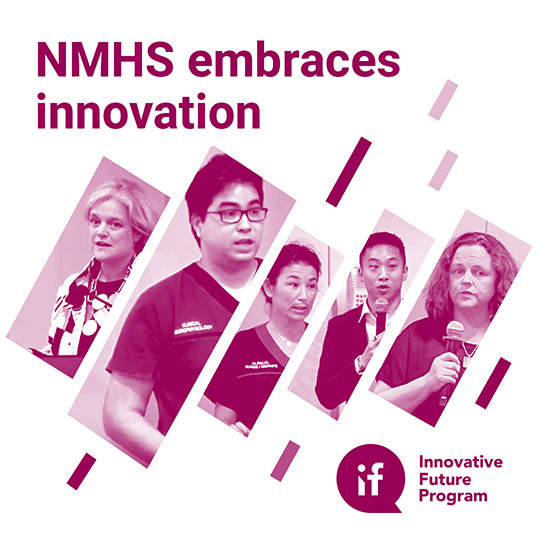North Metro Embraces Innovation

North Metropolitan Health Service (NMHS) is raising the profile of innovation!
The NMHS Innovative Future (IF) Program aims to bring out the best creative ideas and inspire staff to experiment, generate something new, or solve long-standing problems that will make positive change to the organisation. Its goals are to deliver excellent health care for our communities, invest in our staff and culture, and see the NMHS thrive and transform.
The inaugural NMHS Shark Tank in May 2021 invited 13 brave and talented NMHS team members to pitch their ideas live to a panel of judges, resulting in six fully supported projects. These creative ideas range from process automation to introducing virtual reality for patient care. So far, the IF Program has helped support 39 projects, which are either completed or underway across NMHS.
Examples of these projects include:
- improving patient outlooks with ceiling art,
- a new patient care model - early supported discharge for delirium patients,
- waiting room mobile phone charging stations,
- freshly made in-house soup of the day
- improved workflow and efficiency in Outpatient Pharmacy,
- tablet-based hearing test to improve patient flow and reduce waitlist, and
- ceiling TV to reduce anxiety in patients preparing for ECT.
Here is a small sample of other projects in more detail:
Revolutionising Telehealth for adults with Cystic Fibrosis
Physiotherapy and exercise are an integral part of the management of Cystic Fibrosis (CF), though adults with CF normally have limited access to home-based specialist physiotherapy and are unable to participate in community-based group exercise due to cross-infection risks. A Sir Charles Gairdner Hospital (SCGH) physiotherapist saw this problem as an opportunity to innovate and sought to establish a telehealth home-based exercise service providing supervised individual and group exercise sessions.
The goal of the project was to increase access to specialist physiotherapy and group-based exercise to improve patient outcomes and reduce healthcare utilisation, including hospital admission. A pilot program of individual and group sessions including a variety of exercise styles such as interval training, strengthening, yoga and Pilates-style work outs was established. The exercise sessions allowed participants to interact and socialise whilst exercising, enhancing both physical and mental wellbeing. So far the program has been a great success with plenty of positive feedback from the CF participants; there have even been some pets participating!
Read the full news article (external site).
ShiftMatch: A staffing management system
ShiftMatch was implemented across SCGH and Osbourne Park Hospital, to improve the management of filling short nursing shifts. ShiftMatch is a web-based rostering system that automatically matches suitably qualified staff to roster shortages, and communicates the shortage to them via SMS, email or Push notification. The new booking system has improved administrative workloads and reduced the risk of error, as well as standardised processes and increased transparency, efficiency and communication in the management of casual and part-time nursing staff.
Read the full news article.
Advanced Vestibular Physiotherapist to reduce Ear, Nose and Throat waitlist
Physiotherapy assessment and management can greatly assist people with vestibular issues which includes symptoms of dizziness, vertigo, unsteadiness and falls. Vestibular issues can have a large impact a person’s ability to participate in their activities of daily living, quality of life and their ability to be an active member of the community. Quite often older patients will be unwilling to leave the house because of the symptoms or the fear associated with it.
A Senior Physiotherapist at SCGH had the idea to use his skills and experience to expand the vestibular physiotherapy / Ear, Nose and Throat (ENT) model to enhance patient access to this service, provide earlier intervention and address the problem of significant ENT outpatient waitlists.
Working closely with the SCGH ENT team, the Senior Physiotherapist created and piloted an Advanced Physiotherapy Vestibular service that appropriately targets ENT referrals which are triaged to the Physiotherapy Vestibular clinic, where patients are assessed (often using the specialised goggles) to establish whether they can be solely managed by physiotherapy or need to continue to be followed up by an ENT doctor. The aim of the pilot project was to shorten the outpatient waiting list for certain ENT specialties and start patients on rehabilitation sooner. The feedback from patients has been positive with the majority not needing to see an ENT doctor after their physiotherapy appointment.
Read the full news article (external site).

